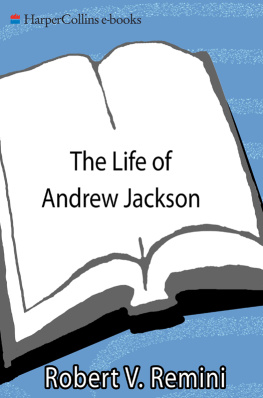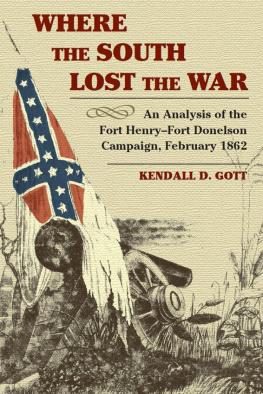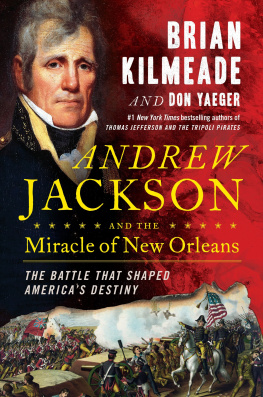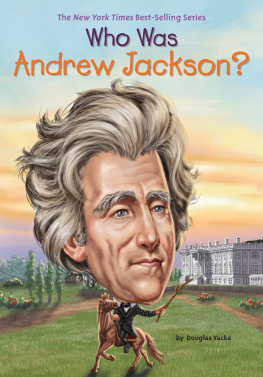New Perspectives on Jacksonian America
Mark Cheathem, Cumberland University
Beth Salerno, Saint Anselm College
series editors
This series examines the period from 1812 to 1861, spanning the decades when Andrew Jackson was a significant figure both in life and in memory. The chronological definition of the series recognizes the importance of the War of 1812 in elevating Jackson to national recognition and his continued importance, even after his death in 1845, to United States politics and society in the years leading up to the Civil War. But while Jackson gives one name to this period, the alternative titles of early republic, antebellum, and age of association make clear how political, economic, sectional, and organizational movements intersected to shape this critical era. The editors are particularly interested in books that address the democratization of the United States, broadly defined, and the many groups that jockeyed for power and influence in that process.
EDITORIAL ADVISORY BOARD
John Belohlavek, University of South Florida
Andrew K. Frank, Florida State University
Lorri Glover, Saint Louis University
Ronald A. Johnson, Texas State University
Stephen A. Mihm, University of Georgia
Kirsten E. Wood, Florida International University
2017 by Vanderbilt University Press
Nashville, Tennessee 37235
All rights reserved
First printing 2017
This book is printed on acid-free paper.
Manufactured in the United States of America
Library of Congress Cataloging-in-Publication Data
LC control number 2016042810
LC classification number E382.1.D57 S64 2017
Dewey classification number 973.5/6092 [B]dc23
LC record available at lccn.loc.gov/2016042810
ISBN 9780-826521637 (cloth)
ISBN 9780-826521651 (ebook)
ACKNOWLEDGMENTS
I should begin by stating that I am not a professional historian. I am, rather, a plant physiologist, but I have been a history nut my entire life. While in graduate school at Texas A&M University back in the 1980s, I decided that in addition to whatever contributions I might make to my scientific profession, I owed it to my love of history to attempt a contribution in the field. In my various readings I kept running across Donelson. I decided to undertake his biography, which at the time seemed not to have been done. So whenever I could, I holed up in the Sterling C. Evans Library poring through dusty books or cranking through rolls of microfilm. My post-doctoral work at Duke University allowed me access to the collections there and at the University of North Carolina at Chapel Hill. Once I landed at my permanent faculty appointment at the University of Texas of the Permian Basin in Odessa in 1990, I did my best, despite the challenges of its geographic remoteness, to continue working on the book, in fits and starts as imposed by the demands of my real job. All in all, Donelson has lived with me for over thirty years.
Along the way I was scooped not once but twice. I discovered early on that the late R. Beeler Satterfield had written his PhD dissertation in 1960 on Donelson, which he published as Andrew Jackson Donelson: Jacksons Confidant and Political Heir (Bowling Green, KY: Hickory Tales, 2000). Then Mark R. Cheathem published his PhD dissertation as Old Hickorys Nephew: The Political and Private Struggles of Andrew Jackson Donelson (Baton Rouge: Louisiana State University Press, 2007). Mark and I have exchanged e-mails and newspaper clippings on Donelson, but to maintain my interpretive independence I did not read either book until I had finished the first draft of mine.
Meanwhile, the Donelsons found me, starting with Lewis R. Donelson, a great grandson of Andrew Jackson Donelson, now 99, the paterfamilias of the Donelson clan and still an active attorney with Baker-Donelson in Memphis. His cousin, Andrew Jackson (Jack) Donelson, MD, of Bowling Green, Kentucky, graciously let me dig through boxes of Donelson family material. I thank them for their support and assistance, and my hope at this writing is that Lewis will yet see the published book.
I would also like to thank Mark Cheathem, the anonymous reviewer, and Vanderbilt University Press for selecting mine as one of the inaugural books of their New Perspectives on Jacksonian America series. Marks longtime support is especially appreciated, as he knows that my take on Donelson is frequently very different from his. Thanks to Michael Ames, Joell Smith-Borne, and the rest of the staff at Vanderbilt University Press for patiently guiding me through the publication process.
When I quote Donelson and his contemporaries, I retain their original spellings and orthography, using [sic] and corrective square brackets only minimally to prevent confusion. The strong personality of Andrew Jackson, in particular, shines through his inimitable spelling, punctuation, and grammar. Needless to say, the errors that no doubt remain in this work are my entire responsibility.
Research on this book began largely as a solitary activity, but I gradually came to realize what every other writer learnsthat even writing becomes a communal effort, involving the help of many people at every level. My thanks go to the dedicated staff at all the libraries and archives I have used over the years. Where individuals have been especially helpful in producing a particular source, I thank them in the appropriate citation notes. Special thanks to Marsha Mullin at the Hermitage for providing a number of valuable Donelson materials. Thanks also to Johnny Summer of Bolivar County, Mississippi, who drove me over backroads and cotton fields to show me the rotting lumber pile amid tangled undergrowth that once was Excelsior Place, Donelsons last plantation home.
The transition from professional to personal thanks begins with Hubert and Debbie Reddin Van Tuyll, both now professors of, respectively, History and Communications, at Augusta University. They are among my oldest friends from graduate school at Texas A&M; they have provided over thirty years of support, advice, good conversation, and no telling how many games of Diplomacy.
Personal thanks go to all the members of my family who have always wondered about my strange interests. Everything that I owe my parents is, I hope, best expressed by the dedication of this book. Who knows, maybe my sisters, Susan Denson and Gail Necker, can find a use for this book in the history courses that they teach. And maybe now my nephews, Jordy and Garrett Denson, who are both years younger than my involvement with Donelson, can understand why Uncle Doug was always such a rich source of obscure knowledge.
Last, there are all the students whom it has been my joy to have taught in classes over the years. It has been my greatest source of professional pride that in more than twenty years as the University Health Professions Adviser, I have had the opportunity to help place so many aspiring and inspiring young people into medical, dental, and other health professional programs, with scores of them now in practice around the country. Special among these is Jose Meza, now an obstetrician/gynecologist in Lawton, Oklahoma. While an undergraduate here years ago he fussed at me constantly to go finish the Donelson book. Since then he and his wife, Sarah, have adopted me into their family, and their six wonderful children (Cassy, Mason, Jacob, Joseph, Emma, and Philip) call me Papa Spence.







